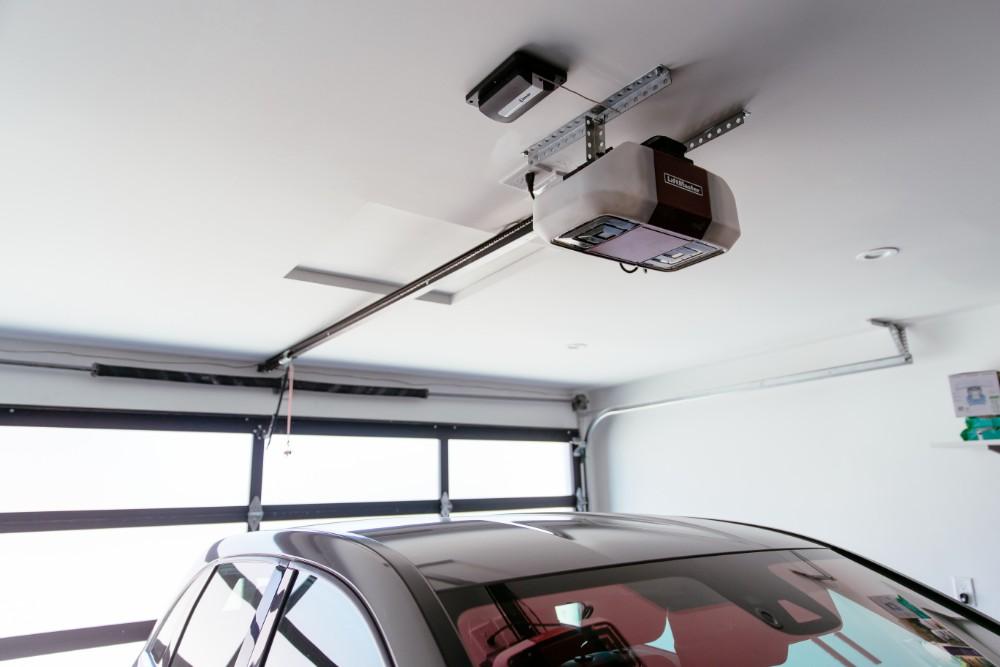A garage door opener is a vital component of your home’s security and convenience. It’s the silent workhorse that allows you to effortlessly open and close your garage door with the push of a button. But like any mechanical device, garage door openers have a finite lifespan. In this article, we’ll delve into the factors that influence the average life of a garage door opener, how to extend its longevity, and when it might be time for a replacement.

Understanding Garage Door Openers
Before we discuss the average lifespan of garage door openers, it’s essential to understand the basic types and components:
- Types of Garage Door Openers:
- Chain Drive: These are robust and reliable but can be noisy.
- Belt Drive: Known for their quiet operation, they use a rubber belt to move the door.
- Screw Drive: These openers use a threaded steel rod to move the door and are low-maintenance.
- Direct Drive: The motor itself moves along the rail, offering quiet operation.
- Key Components:
- Motor: The motor is the heart of the garage door opener and provides the power to lift and lower the door.
- Drive Mechanism: The type of drive mechanism determines how the motor’s power is transmitted to the door.
- Remote Control: This handheld device allows you to operate the garage door from a distance.
- Wall Control Panel: Typically installed inside the garage, it provides additional control options.
Factors Influencing the Lifespan of a Garage Door Opener
Several factors can impact the average life of a garage door opener:
- Quality of the Opener:
- The quality of the opener itself plays a significant role. Higher-quality openers tend to have longer lifespans.
- Usage Frequency:
- The more frequently you use the garage door, the shorter the opener’s lifespan. If you have a busy household with multiple daily comings and goings, the opener will wear out faster.
- Maintenance:
- Regular maintenance can significantly extend the lifespan of your garage door opener. Lubricating moving parts, checking for loose bolts, and keeping the opener clean are essential maintenance tasks.
- Climate and Environment:
- Extreme temperatures and environmental factors like moisture and dust can affect the longevity of the opener. Severe conditions may lead to a shorter lifespan.
- Quality of Installation:
- Proper installation by a skilled technician can ensure that the opener functions optimally. Poor installation can lead to premature wear and tear.
- Type of Drive Mechanism:
- The type of drive mechanism can also influence the lifespan. Chain drives are durable but may require more maintenance, while belt drives are known for their quiet operation.
Average Lifespan of Garage Door Openers
The average life of a garage door opener varies, but generally, you can expect:
- Chain Drive Openers: These typically last 10-15 years.
- Belt Drive Openers: With regular maintenance, they can last 15-20 years.
- Screw Drive Openers: These have an average lifespan of 10-15 years.
- Direct Drive Openers: Known for their longevity, they can last 15-20 years or more.
Extending the Lifespan of Your Garage Door Opener
To maximize the lifespan of your garage door opener, consider the following tips:
- Regular Maintenance:
- Keep all moving parts well-lubricated and check for any loose bolts or components.
- Keep It Clean:
- Remove dust and debris from the opener’s components and sensors.
- Proper Installation and Repairs:
- Ensure the opener is correctly installed and promptly address any necessary repairs.
- Climate Control:
- If possible, keep the garage at a moderate temperature to reduce stress on the opener.
Read too: How To Reset Craftsman Garage Door Opener 1 2 Hp
Signs It’s Time for a Replacement
Even with proper maintenance, there comes a point when a garage door opener reaches the end of its life. Some signs that it’s time for a replacement include:
- Excessive noise during operation.
- Sluggish or erratic movement of the garage door.
- Frequent breakdowns and repairs.
- Outdated safety features.
When you notice these signs, it’s a good idea to start considering a new garage door opener to ensure the continued security and convenience of your home.
Conclusion
The average life of a garage door opener can vary based on multiple factors, including usage frequency, quality, and maintenance. By understanding these factors and following proper maintenance practices, you can extend the lifespan of your garage door opener, ensuring reliable operation for years to come. And when the time comes for a replacement, modern openers offer enhanced features and security to meet your needs.



Leave a Reply